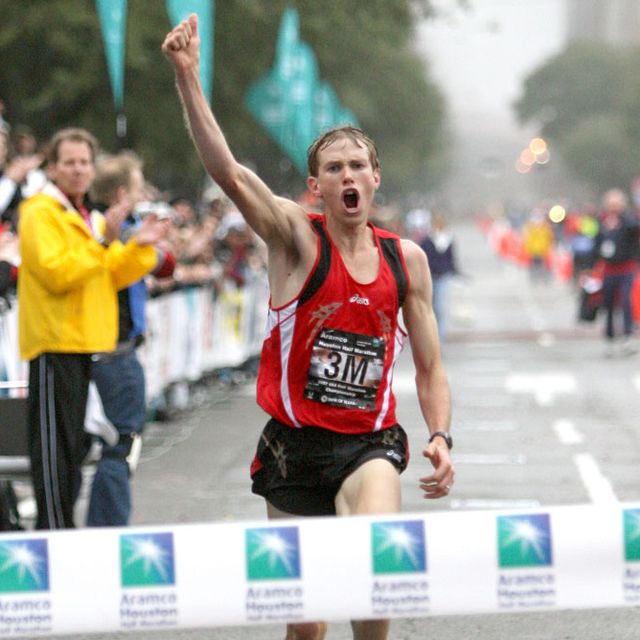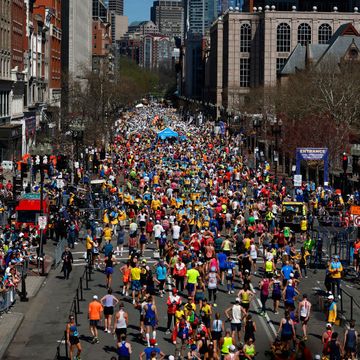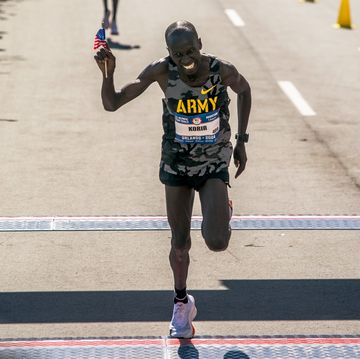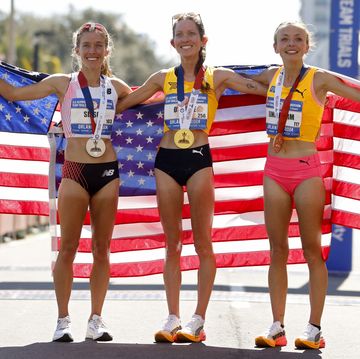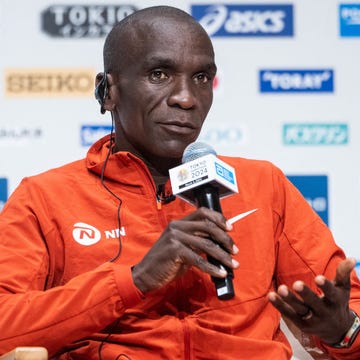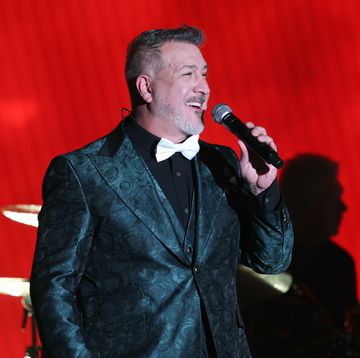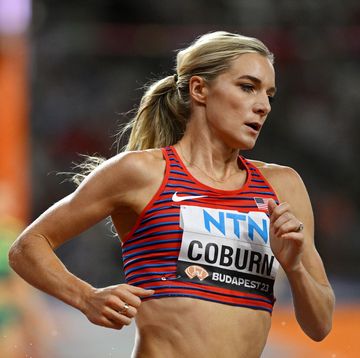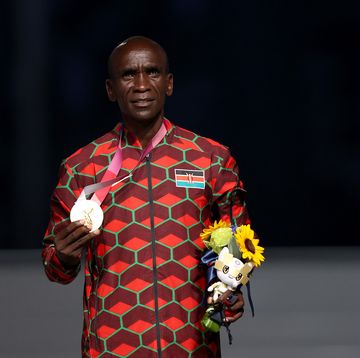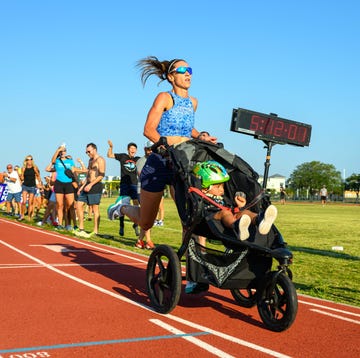Ryan Hall raced with flashes of brilliance rarely seen by Americans of recent vintage, in the process attracting legions of fans. I have long been one of those. In particular, I remember three of his top efforts.
• In February 2006, I peered at my computer screen and its flickering live video of his runaway win in the national 12K cross-country championships at historic Van Cortlandt Park. That day he charged away from runner-up, Jorge Torres, by 27 seconds, and beat cross-country ace Dathan Ritzenhein by 49 seconds. After, I called a friend in Texas to declare, “I think I’ve just seen the future of U.S. distance running.” I wish my stock market picks were so prescient.
• Eleven months later, in January 2007, I was enjoying a quiet Sunday morning at home when the phone rang. It was my colleague, Bart Yasso. “I’m standing at the finish line of the Houston Half Marathon,” Bart began, “and Ryan Hall just came through in 59:43.” I hadn’t been so stunned by an American running result since 1994 when Alberto Salazar won the Comrades Marathon.
• In early November 2007, New York’s Central Park thrummed with more excitement than I have ever seen at a road race. The Olympic Marathon Trials had come to the Big Apple on a loop course that allowed for maximum spectator interaction. Hall responded to the cheering throngs as he often did to fan enthusiasm—with an emotional surge of his own, touring the second 13.1 miles in an almost impossible (given the Central Park hills) 1:02:45.
Then, at the very moment when his longtime Olympic dream came true, he learned that his friend and namesake Ryan Shay had died during the race. No other runner has ever had to deal with so much joy and grief at the same time. “This sport is supposed to be fun,” he told the press. “But today … my heart goes out to Ryan’s family.”
Of course, Hall’s best-remembered race is the 2:04:58 (fourth place) he ran in the 2011 Boston Marathon. There he set the pace for 10 miles before ceding the front to Geoffrey Mutai and Moses Mosop, who finished in 2:03:02 and 2:03:06. Typically, Hall gained confidence, not fear, from the crazy-fast early miles. “It was exciting to see our splits,” he said. “They helped me maintain my momentum and keep the excitement building.”
RELATED: Ryan Hall Through the Years
Some believe that Hall was born at altitude and born to greatness. There is a kernel here, but only that. While raised at high-altitude Big Bear, California, he was actually born at sea level in Washington. As a young teen, he wanted to be a baseball player like his father, Mickey. But dad was also a triathlete, so one day young Ryan joined him for a 15-mile run around a lake. Fifteen miles! In basketball shoes. On his first serious run. Yes, he had talent.
And he loved to go hard—always hard. Something drove him. In high school, even with his father looking on protectively, he trained past his peak several times. At Stanford, his more-laid-back college teammates didn’t appreciate the brash way he attacked every workout. Once he launched into a marathon career, his long tempo runs attracted a YouTube following. He was always trying to beat last week’s or last season’s times. This is not a recipe for long term progress; ask any experienced coach. It makes you wonder if his current medical issues—his wife, Sara, told Runner’s World of his crushing fatigue; Hall told Competitor last October that he has clinically low testosterone—have deep roots.
And, oh, he had coaches. In the early marathon years, the Joe Vigil-schooled Terrence Mahon, a sort of philosopher-exercise physiologist, coaxed Hall to several great races. When the good times faltered, particularly after a fatigue-induced Did Not Start at the 2010 Chicago Marathon (Note: excessive tiredness again), Hall, who had always been vocal about his deep faith, looked elsewhere. As in, upward. He declared that he had accepted God as his new coach, and began to enumerate how Christian beliefs like the Holy Trinity could reveal training advice such as an easy day/easy day/hard day pattern.
Such declarations earned him thousands of new fans among the most devoted but also widespread Internet message-board scorn. Nonetheless, it must be noted that he ran his 2:04:58 at Boston during this period. The last several years, as his running spiraled downward, Hall turned to Renato Canova, an Italian coach working for a time in Kenya, and then to the revered Jack Daniels, who he first met in his high school running days. Nothing and no one seemed capable of helping.
When I first interviewed Ryan face to face in the spring of 2007, I worried about his religious leanings. I wanted to talk mainly about his training and racing, but felt I shouldn’t overlook any important part of his life. Could we find a middle ground? I was concerned he would prove a zealot.
Not a problem. Slouched in a chair in front of an eager crowd, sleepy-eyed and tousle-haired, he responded simply that his faith had always been central to his life, and would always remain central. It was that night that I first noted a theme that I believe contributed to his most outstanding performances. I must have asked if he thought God influences race outcomes. He answered (not verbatim): “I don’t believe that God wants me to win any particular race. He just tells me that anything is possible, and that this could be the day when amazing things happen for me.”
I’ve never been a big believer in sports psychology, at least not the “you can visualize your own success” hoo haw. In Hall’s religious views, however, I detected a more powerful force. I doubted anyone else discerned the same, so I was surprised when I read Tim Noakes’s comments in a 2012 New York Times article about Hall. “If Ryan finds special strength in his religion,” said Noakes, author of The Lore of Running, “it’s much more important for him than training at altitude.”
So now Hall won’t be aiming for his third-straight U.S. Olympic Marathon team in the February 13 Marathon Trials in Los Angeles. But Sara will be shooting for her first—and apparently with Ryan as her coach, as she recently announced. While that sounds all upside down, maybe it’s not. In 2000, Sara Bei (now Hall) won the Foot Locker Cross Country championships while Ryan could manage only third behind Ritzenhein and Alan Webb.
Hall’s low testosterone and fatigue upended his training. The same, more or less, happened to Webb a few years ago when he should have been still in his prime, as should Hall. Go back 30 years, and you can add Alberto Salazar to the list. Three world-class American male distance runners who soured before their time. And just yesterday I wrote a story about a proposed “Male Athlete Triad.” Three anecdotes doesn’t constitute cause-and-effect, but this is no doubt a story line due to get more attention.
Sara and Ryan Hall stand out for much more than their running achievements. In 2009 they launched The Hall Steps Foundation, dedicated to fighting poverty and improving health in Africa. The past several years, they have spent significant time living and training in Ethiopia while working on Steps projects. Last September, we learned that they were truly walking the walk when they adopted four Ethiopian sisters and brought them home to the U.S. Do you remember the last time two Olympic hopefuls introduced four African children into their hectic lives? Me neither.
As I type these words, I find it both profound and insightful that Ryan Hall’s last Tweet on January 12 reads as follows: “My most hopeless moments are when I have to do my 5 year old daughter’s hair. I feel like a deer in the headlights!” He might be closing out one chapter of his life, but he’s got many more ahead. And I’m not sure that raising four non-English-speaking daughters doesn’t qualify as a more difficult, and important, task than making another Olympic Team.
Now that Hall has announced his retirement, people will ask, “Where does he rank among America's all-time greatest marathoners?” The answer is: It’s a pointless question. We can’t fairly rate runners from different generations. Among Hall’s peers, we find sharp contrast between him and Meb Keflezighi. Meb won an Olympic silver medal and two major American marathons, New York and Boston. Winning is the name of the game, so Meb has to get the nod, even though Hall ran much faster, blazing though the marathon cosmos like a meteor.
During his racing days, Hall actually won only a single marathon—that 2007 race in Central Park. Yet his competitive fierceness elevated and inspired us, because it recalled our greatest champions. In 1972, Frank Shorter crushed the Munich Olympic Marathon field by going to the front much too soon, or so it seemed. Only Shorter knew better. Twelve years later, Joan Benoit bid adieu to the likes of Grete Waitz, Ingrid Kristiansen, Rosa Mota, and Lorraine Moller after just three miles of the first women’s Olympic Marathon. Hubris personified. Only Benoit is the one with a gold medal in her bedside drawer.
Hall ran with a similar bravado, which is why we rallied so eagerly to his side. The generation of American marathoners before him had lost the fire. They ran cautious, steady races, far behind the East Africans, content to eke out a 10- or 15-second PR. You could call them “smart,” but you couldn’t call them heroic.
Hall, on the other hand, ran boldly. He joined the fray, and dared to be great even though he sometimes wasn’t. He followed the Teddy Roosevelt dictum: “The credit belongs to the man who is actually in the arena; who errs, and comes short again and again, because there is no effort without shortcoming; but who does actually strive to do the deeds.”
That’s a pretty good description of Ryan Hall’s approach to racing. So I say, “Bully for you, Ryan. Well done.” We will miss you. We only hope that others will choose to follow your path.
